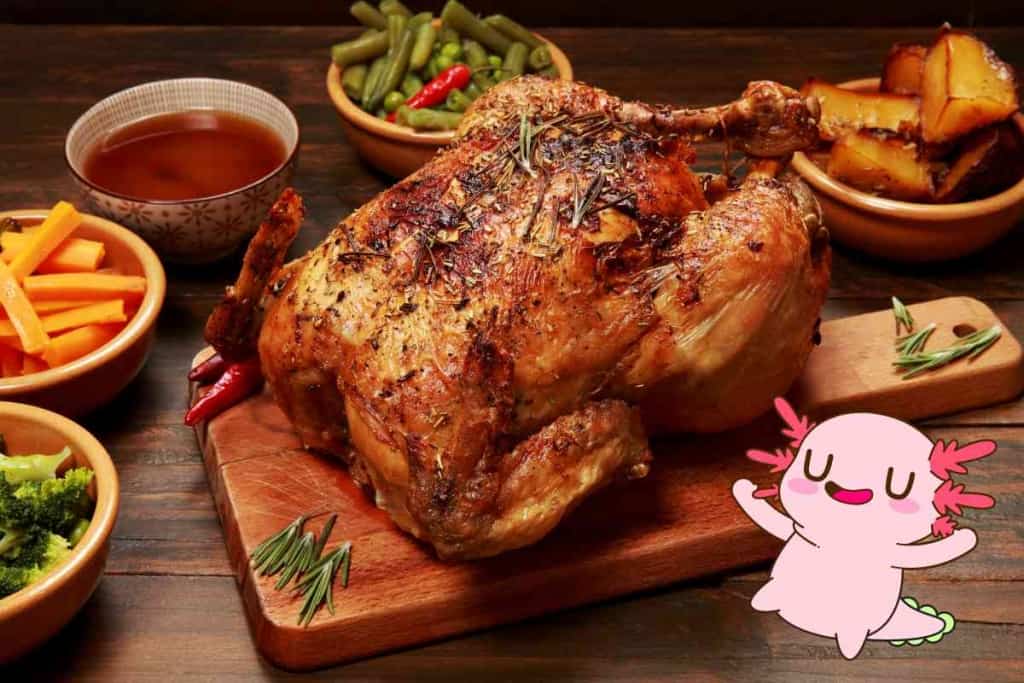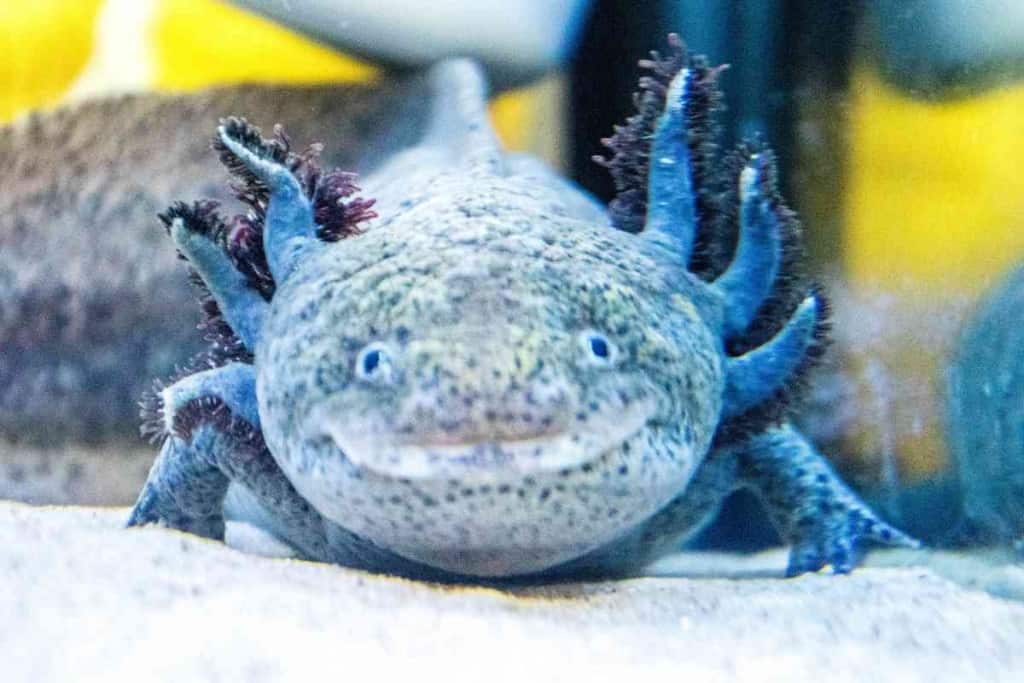Can Axolotl Eat Chicken? Is It Good For Them?
Ever wondered if your axolotl can snack on chicken? Delving into the dietary quirks of these aquatic wonders, this guide examines whether chicken makes a safe treat for axolotls. Join us as we explore this intriguing question and lay out the facts. Dive in!
Can I Feed My Axolotl Chicken?
Axolotls are carnivorous, primarily feasting on aquatic prey. While they can digest a variety of meats, chicken is not a natural or recommended food for them. Occasionally small, cooked chicken pieces might be consumed, but it shouldn’t be a regular part of their diet. Axolotls thrive best on foods like worms, insect larvae, and special axolotl pellets that mimic their natural dietary preferences.
As axolotl owners, we’ve seen these little creatures eat all sorts of food. However, since chicken suits their predatory nature, that’s what we tend to feed them.
Here, we’re going to talk about axolotls eating chicken and what you can do to make the meal healthy for them.

Read Our Full Guide On What To Feed Axolotl
How to Prepare Chicken for Your Axolotl
Step#1: Boil Your Chicken
Many axolotl owners assume that since their pet can eat raw chicken, it doesn’t matter if they feed it directly from the package.
However, axolotls are very susceptible to bacterial infections, and feeding them raw or undercooked chicken increases the risk of exposing them to harmful bacteria such as salmonella and E.coli.
Boiling the chicken kills these bacteria and helps soften the meat for easy chewing and digestion.
So while axolotls can technically eat raw chicken, it’s much safer (and healthier) for them to have boiled chicken in their diet. Taking a few extra minutes to boil and cool the meat before feeding can make all the difference for your axolotl’s health.
Step#2: Shred It Into Small Pieces
When feeding your axolotl, it’s important to shred the boiled chicken into small pieces. Axolotls have relatively short digestive tracts, and large chunks of meat can cause blockages or discomfort.
In fact, shredding the chicken also helps ensure that the axolotl can digest all its food’s nutrients.
Shredding the chicken into smaller pieces allows a greater surface area for digestion.
In addition, shredding the chicken also prevents choking hazards for your pet as they eat. So next time you’re preparing a meal for your axolotl, make sure to shred any meat before offering it as part of their meal. Your pet will thank you for it!
Step#3: Don’t Add Any Salts or Spices
When it comes to feeding your axolotl, the rule of thumb is always to provide them with a varied diet.
Boiled chicken makes for a tasty treat, but it’s important not to add any salt or spices. Excess salts and spices can be harmful to your pet, causing stomach issues and potentially leading to medical complications.
So stick to plain boiled chicken when feeding it to your axolotl, and save the seasoning for your own meal. Variety is key for a healthy axolotl diet, so supplement their meals with other protein sources like blackworms, earthworms, or shrimp.
And don’t forget the plants – adding some chopped spinach or lettuce will round out their meal and provide important nutrients. Keep these things in mind, and your axolotl will surely thrive.

Step#4: Allow the Chicken to Cool Down
It’s important to allow the chicken to cool down before giving it to your pet. Axolotls can’t regulate their body temperature and can easily overheat if they consume hot food.
In addition, excessively hot food can also lead to burns in their mouths and throats. As with any type of cooked meat, don’t feed your axolotl chicken that has been sitting out for a long period of time and is no longer safe for human consumption.
When in doubt, it’s always best to err on the side of caution and let the chicken cool down before serving it to your beloved pet.
Things to Mix With Chicken When Feeding Your Axolotl
Boiled Beef
Did you know that mixing boiled beef into boiled chicken for your axolotl’s meals can give them essential nutrients and variety in their diet?
Beef contains higher levels of iron and zinc, making it a beneficial addition to any axolotl’s meal plan. However, be sure to always thoroughly cook the meat before feeding it to your pet.
Raw or undercooked beef can lead to health issues, so ensure that all beef is properly boiled before serving it to your axolotl.
Adding boiled beef to their diet isn’t necessary for every meal, but integrating it occasionally can give your pet added nutrition and keep their meals exciting.
Overall, boiled beef can be a nutritious addition to your axolotl’s diet if it is cooked properly beforehand.
Brine Shrimp
Many axolotl owners choose to feed their pets boiled chicken as a staple diet. However, brine shrimp can also be a valuable addition to their meals.
Brine shrimp are high in protein and provide crucial minerals and vitamins for axolotls, such as calcium, for healthy bones and muscles.
Plus, brine shrimp have a crunchy texture that can help keep your axolotl’s teeth clean and strong. When feeding brine shrimp to your pet, make sure to thoroughly rinse them before mixing in with the chicken to remove any salt residue.
As always, provide varied meals for your axolotl to ensure they get all the nutrients they need. Adding brine shrimp to their diet is just one way to do so.
Daphnia
While axolotls are primarily carnivorous, providing them with a varied and balanced diet is still important. One great supplement to their regular boiled chicken or other meat diet is daphnia, otherwise known as water fleas.
These small crustaceans are a rich source of proteins and fatty acids and provide some diversity in texture and taste for your axolotl.
Daphnia can be found in most pet stores, either live or frozen. When feeding daphnia to your axolotl, make sure only to give as much as they can eat in one sitting to avoid overfeeding.
Mixing daphnia into their regular meals can enhance their nutrition and provide mental stimulation as they hunt and catch these tiny prey items.
So next time you prepare a meal for your axolotl, consider adding daphnia for a nutritious boost!
Pellets
One of the best ways to diversify your axolotl’s diet is by including pellets as part of their regular meals.
While boiled chicken can provide necessary protein, pellets offer a well-rounded combination of vitamins and minerals that can supplement your axolotl’s diet and promote overall health.
Mix in some pellets to provide a more balanced meal when feeding boiled chicken to your axolotl.
It’s important to remember that pellets should make up no more than 25% of an axolotl’s diet, so moderation is key.
With the right balance of pellets and other foods, you can ensure that your beloved pet receives all the nutrients they need for a long and happy life.
Blackworms
These small black worms are high in protein and are often considered a delicacy among amphibians and fish.
They can be a great supplement to your axolotl’s typical diet of chicken or other meat sources. To feed blackworms to your axolotl, boil them until they turn a pale pink color, then mix them with the chicken or other meat before serving.
These tasty worms may just become your axolotl’s new favorite snack! Be sure not to overfeed them, as blackworms should only compose about 20% of their overall diet.
Include them occasionally for the added nutritional benefit, and a fun treat for your pet.
Key Takeaways
- First, giving them small chunks or shreds of chicken is important, as they may have trouble swallowing larger pieces.
- Secondly, ensure the chicken is fully cooked to avoid potential bacteria or parasites.
- Thirdly, be cautious of feeding too much chicken as it can lead to obesity and affect their health.
- Fourth, feed them other protein sources besides chicken for a balanced diet.
- And finally, ensure that any chicken you give your axolotl does not contain any seasonings or additives that could potentially harm them.
